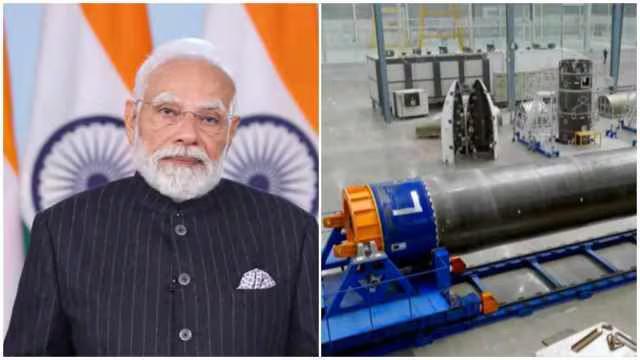
PM Modi unveils Vikram-1, India’s first privately developed orbital rocket
In a historic moment for India’s space sector, Prime Minister Narendra Modi on Thursday inaugurated space startup Skyroot Aerospace’s new Infinity Campus via video conferencing and unveiled Vikram-I, the country’s first privately developed orbital rocket. This significant milestone marks a new era in India’s space exploration and development, with the private sector playing a crucial role in shaping the country’s space program.
During the launch, PM Modi expressed his enthusiasm and pride in the achievement, stating, “It’s a significant leap forward for India’s space sector.” The Infinity Campus, which was inaugurated by the Prime Minister, is a state-of-the-art facility that will enable Skyroot Aerospace to produce one rocket every month, according to the company’s founder, Pawan Chandana. This capability will not only cater to India’s growing demand for satellite launches but also make the country a competitive player in the global space industry.
The Vikram-I rocket, named after Dr. Vikram Sarabhai, a renowned Indian scientist and space pioneer, is a testament to India’s rapidly growing space technology capabilities. The rocket is designed to carry small satellites into orbit, providing a cost-effective and efficient solution for satellite launches. With the development of Vikram-I, India has joined an exclusive group of countries that have successfully developed and launched privately funded orbital rockets.
The inauguration of the Infinity Campus and the unveiling of Vikram-I are significant milestones in India’s space program, which has been gaining momentum in recent years. The Indian Space Research Organisation (ISRO) has been at the forefront of the country’s space endeavors, with notable achievements such as the Mangalyaan mission to Mars and the Chandrayaan-1 lunar mission. However, the involvement of private players like Skyroot Aerospace is expected to further accelerate the growth of India’s space sector, bringing in new technologies, innovations, and investments.
The Infinity Campus, which will serve as the manufacturing hub for Skyroot Aerospace, is equipped with cutting-edge facilities and equipment, enabling the production of high-quality rockets and spacecraft components. The campus will also provide a platform for research and development, allowing scientists and engineers to work on new technologies and innovations that will drive the growth of India’s space industry.
The development of Vikram-I and the establishment of the Infinity Campus are also expected to create new opportunities for employment and skill development in the space sector. As the demand for satellite launches and space-related services continues to grow, the need for skilled professionals in areas such as rocket engineering, satellite development, and space mission operations will increase. The Infinity Campus will provide a platform for training and development, enabling young engineers and scientists to acquire the skills and expertise required to work in the space industry.
The success of Skyroot Aerospace and the development of Vikram-I are also a testament to the supportive ecosystem created by the Indian government for startups and private players in the space sector. The government has introduced several initiatives and policies to encourage private investment in space technology, including the establishment of the Indian National Space Promotion and Authorisation Centre (IN–SPACe). These initiatives have helped create a favorable environment for startups like Skyroot Aerospace to thrive and contribute to the growth of India’s space sector.
In conclusion, the unveiling of Vikram-I and the inauguration of the Infinity Campus mark a significant milestone in India’s space program, highlighting the country’s growing capabilities in space technology and development. As India continues to push the boundaries of space exploration and development, the involvement of private players like Skyroot Aerospace is expected to play a crucial role in shaping the country’s space sector. With the support of the government and the growth of a supportive ecosystem, India is poised to become a major player in the global space industry, with the potential to inspire future generations of scientists, engineers, and innovators.




